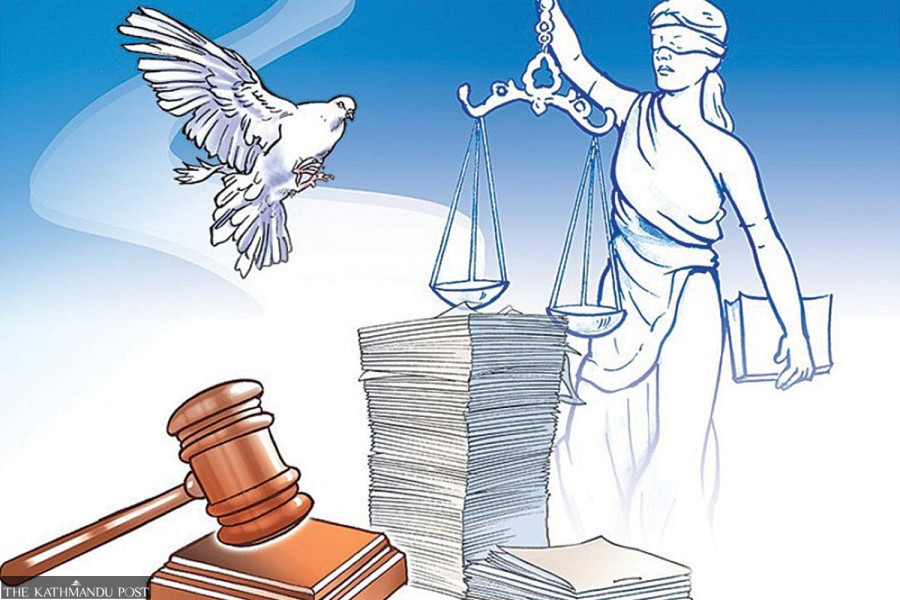National
Nepal non-committal to UN on revising transitional justice amendment bill
Four United Nations special rapporteurs had sought clarification from the government on five issues.
Binod Ghimire
The government has refused to commit to the United Nations on revising the Enforced Disappearances Enquiry, Truth and Reconciliation Commission Act amendment bill.
Responding to the concerns from the United Nations special rapporteurs on various thematic groups, the Office of the Prime Minister and Council of Ministers replied that as the bill is under the Parliament’s consideration, it is beyond the government’s authority to commit to any changes in it.
Writing to the government on June 9, the special rapporteur on the promotion of truth, justice, reparation and guarantees of non-recurrence, the rapporteur of the working group on enforced or involuntary disappearances, the special rapporteur on extrajudicial, summary or arbitrary executions and the special rapporteur on violence against women and girls, its causes and consequences, had sought Nepal’s response as to what it was doing to make the bill compatible to the international standards.
“In response, we have said the bill is now the property of the federal Parliament. The executive cannot interfere in the business of the legislative. It is against the principle of separation of powers,” Aruna Joshi, chief of the Human Rights and International Treaty Agreement division at the prime minister’s office, told the Post. She said they responded to the United Nations through the Ministry of Foreign Affairs on Monday.
The sub-committee of the Law and Human Rights Committee of the House of Representatives is giving final shape to the bill after consultation with stakeholders including the victims of the Maoist insurgency (1996-2006).
In their joint letter, the four special rapporteurs had sought clarification from the government on five different issues claiming that several provisions in the bill appear to be incompatible with international standards of transitional justice.
They had asked how the bill introduced in Parliament on March 19, 2023 complies with international norms and standards in the field of truth, justice, reparation and guarantees of no recurrence. They also demanded information about the measures taken to ensure a transparent and inclusive consultative process with victims and civil society at all stages of the design and implementation of transitional justice measures, and in particular during the drafting of the amendment.
Through the letter they also sought an assurance that the views received from victims and civil society would be given due consideration and included in the current bill.
“Please inform which measures were adopted to ensure that the full range of human rights violations and abuses committed in the context of the armed conflict can be examined by the transitional justice mechanisms and how the categorization of human rights violations and of serious human rights violations in the bill are in line with international standards on the matter. Please further inform how the categorization of human rights violations susceptible to amnesties is in line with international standards on the subject,” reads one of the points in the letter from the special rapporteurs.
Their letter also seeks information on the measures taken to ensure the independence, impartiality and competence of the mechanisms involved in the process of transitional justice including the Truth and Reconciliation Commission and the Commission on the Enquiry of the Enforced Disappeared Persons in compliance with international standards.
Just like the victims groups, human rights defenders and national and international human rights organisations, the UN thematic groups also raised questions over the categorisation of the cases of rights violations from the insurgency.
“The bill introduces a two-pronged categorisation of violations of human rights to be considered by the transitional justice mechanisms, which appears to be inconsistent with the classification of such violations under international standards,” reads the letter.
According to article 2 (4) of the bill, “human rights violations” comprise murder; sexual violence; physical or psychosocial torture; abduction or hostage taking; unlawful detention; assault, dismembering or making disabled; looting, seizing, vandalising or arson of private or public property; forceful eviction or displacement; and other inhuman acts against human rights and humanitarian law committed against unarmed civilians or communities in a widespread and targeted manner.
Many of the crimes included under this category would constitute serious human rights violations under international law, they have said.
The UN thematic committees also have expressed their reservation on the bill’s failure to mention “crimes against humanity” on the list of serious human rights violations.
“We restate our concern at the reported lack of consultation up until this point with victims and civil society concerning the content of the bill currently before Parliament, and at the failure to introduce some of the views articulated by them in July 2022 therein,” the letter reads.
In this connection, “we recall the requirements under international law to meaningfully consult victims and affected communities on decisions that affect them and to ensure their effective participation in the design and implementation of transitional justice measures,” according to the letter.




 13.12°C Kathmandu
13.12°C Kathmandu














